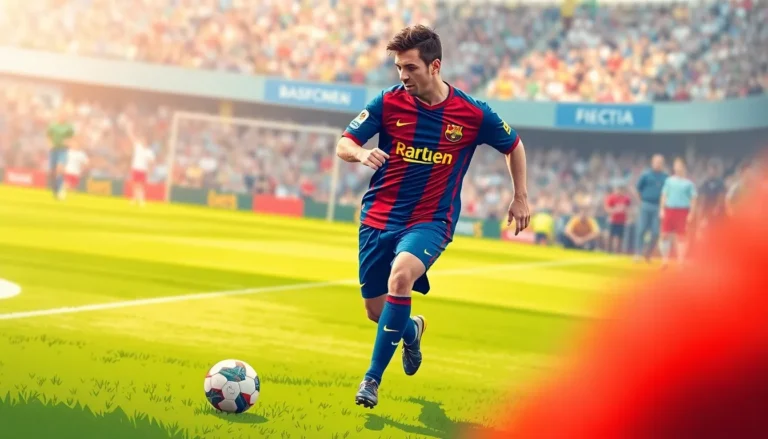Table of Contents
ToggleThe road to the FIFA World Cup is anything but a stroll in the park. For European teams, it’s a wild rollercoaster ride filled with nail-biting moments and unexpected plot twists. As nations battle it out for a coveted spot in the tournament, fans are treated to a spectacle of skill, drama, and occasionally, a few questionable referee decisions that leave everyone scratching their heads.
Overview of FIFA World Cup European Qualifiers
FIFA World Cup European Qualifiers determine which national teams from Europe advance to the tournament. The qualifying process features intense matches that showcase the skill and determination of teams across the continent.
Teams compete in groups, aiming to secure a top placement for direct qualification. A total of 55 teams participate in this stage, creating a highly competitive atmosphere. From Group A to Group J, each group includes a mix of established teams and emerging football nations.
Qualification matches occur over several months, with teams playing home and away games. Points are awarded for wins and draws, pushing teams to perform at their best. As the matches unfold, fans experience unforgettable moments and dramatic twists that define the qualifiers.
Controversial referee decisions can significantly influence qualification outcomes. The stakes are high, and even a single point can be crucial in group standings. Historical rivalries often add excitement, drawing large crowds and increasing television viewership.
Performance in qualifiers can reflect a team’s ability and readiness for the World Cup. Success in this phase bolsters national pride and boosts team morale. Each qualifying campaign is unique, with new strategies and key players emerging.
The pathway to the World Cup is filled with challenges. Teams must adapt to various playing conditions and tactics used by opponents. Overall, the qualifiers not only serve as a pathway to the tournament but also as a platform for players to showcase their talent on an international stage.
Historical Context
The journey of European teams in FIFA World Cup qualifications is rich with significant events and milestones. Various nations have established themselves as football powerhouses, shaping the landscape of international competitions.
Key Milestones
Milestone tournaments often define individual nations’ footballing histories. Italy secured their first World Cup spot through European qualifiers in 1934, marking a notable achievement. France’s qualification for the 1998 tournament, where they later emerged champions, linked their development and success in international football. Germany’s consistent qualification since 1954 highlighted their dominance and exceptional talent pool. Additionally, smaller nations, like Greece in 2004, surprised the world with unexpected qualifications, illustrating how the European qualifiers can shock the football community.
Impact on Football Development
Development within European football closely relates to the outcomes of World Cup qualifiers. Success in these qualifiers boosts national investment in youth programs and training facilities, fostering talent at grassroots levels. Nations participating in intense qualification campaigns often elevate their competitive standards. Teams like Portugal showcased the benefits of developmental focus, producing world-class players like Cristiano Ronaldo. The exposure from qualifying rounds enables players to gain experience critical for international success, enhancing the entire European football ecosystem.
Current Format of the Qualifiers
The FIFA World Cup European Qualifiers feature a structured format designed to ensure competitive balance among participating teams.
Structure of the Qualification Process
Teams compete in groups based on the UEFA coefficient rankings. A total of 55 national teams are divided into ten groups, with the top two teams from each group securing direct spots in the World Cup. Groups consist of five or six teams, ensuring that each nation plays multiple matches across several months. The remaining teams may enter playoffs, providing an additional opportunity for qualification. This multi-level structure keeps the competition intense and unpredictable, enhancing the stakes as teams vie for limited spots.
Tournament Schedule and Key Dates
The qualifiers typically commence two years before the World Cup. Key dates for matches occur during FIFA’s designated international windows, allowing teams to prepare extensively. Initial matches occur with top teams facing off in crucial encounters. Following the group stage, the playoffs take place, determining the final representatives for the tournament. Dates for these playoffs usually fall in March of the year of the World Cup, maintaining a steady rhythm as teams approach the final hurdle. This schedule ensures that fans can anticipate thrilling matchups while teams have adequate time to strategize and adjust.
Notable Teams and Players
European qualifiers showcase a range of remarkable teams and players, reflecting the intense competitive spirit of the tournament.
Outstanding Performances
Certain teams consistently impress during the qualifiers. Italy, known for its tactical prowess, boasts multiple titles and a robust qualification history. France showcases skill with a blend of experience and youth, highlighted by their 1998 and 2018 World Cup victories. Germany, with its strong football foundation, remains a formidable presence, remaining in the World Cup since 1954. Smaller nations, too, can claim memorable moments; for instance, Iceland shocked many during the 2018 qualifiers, demonstrating that grit often trumps expectations. These standout performances enhance anticipation for the World Cup as fans rally behind their teams.
Emerging Talents
Exciting new players emerge during the qualifiers, capturing attention with their skill. Poland’s young star, Jakub Kiwior, has become a key figure in the national squad. Spain has nurtured emerging talent like Pedri, showcasing a bright future for La Roja. Denmark’s Mikkel Damsgaard has also caught the eye with his dynamic play, contributing significantly in crucial matches. Meanwhile, England’s Jude Bellingham quickly established himself as a pivotal player, making waves in international football. These talents not only enhance their respective teams but also signal the evolution of European football on a global stage.
Challenges and Controversies
Challenging dynamics often arise during the FIFA World Cup European qualifiers. Qualification issues frequently emerge, leading to intense debates among fans and players. Many teams face difficulties securing consistent performances. Rigorous schedules may contribute to fatigue and impact match outcomes. Some teams underperform despite having strong rosters, leading to unexpected eliminations. Notably, regulations and ranking systems can cause further complications, leaving teams frustrated over missing qualification spots.
Political and social factors also influence the qualifiers. Nationalistic sentiments may alter the atmosphere of matches, while external factors affect team morale. Political tensions between countries can hinder sportsmanship, creating an uneasy environment. Additionally, social issues like racism and discrimination surface during games, prompting discussions on inclusivity in football. UEFA’s efforts to address these concerns represent a commitment to improving the sport, ensuring that qualifying matches uphold the integrity of competition.
Future of FIFA World Cup European Qualifiers
The FIFA World Cup European Qualifiers will see several upcoming changes and innovations that aim to enhance the competition. New technologies, such as VAR, are expected to further ensure fair outcomes in matches. UEFA is also exploring formats that may increase the number of teams advancing to the World Cup, potentially expanding opportunities for smaller nations. Additionally, flexibility in scheduling can improve match days and reduce player fatigue. Fan engagement initiatives are likely to grow, enhancing the overall spectator experience both in stadiums and online.
Upcoming Changes and Innovations
Innovative formats may emerge in future qualifiers, altering how teams compete for World Cup spots. Expansion of the qualifying pool could allow more nations to participate, fostering greater excitement. Introduction of enhanced data analytics tools will likely help teams in preparing strategically for their competitors. Other technological advancements could include real-time decision-making tools for referees and coaches. The emphasis on fan interaction is set to increase, making the qualifiers more accessible and engaging. Overall, these changes are designed to promote fair play and elevate the overall quality of the matches.
Conclusion
The FIFA World Cup European Qualifiers embody the essence of competitive football in Europe. As teams navigate the highs and lows of qualification, they not only showcase their skills but also inspire national pride among fans. The journey is filled with unforgettable moments and emerging talents that shape the future of the sport.
With innovations on the horizon and a commitment to fair play, the qualifiers are set to evolve further. This evolution promises to enhance the excitement and competitiveness of European football. As teams prepare for the next round of qualifiers, anticipation builds for the dramatic matches that will ultimately determine who will represent Europe on the world stage. The road to the World Cup is long and arduous, but it’s a journey that captivates millions.




